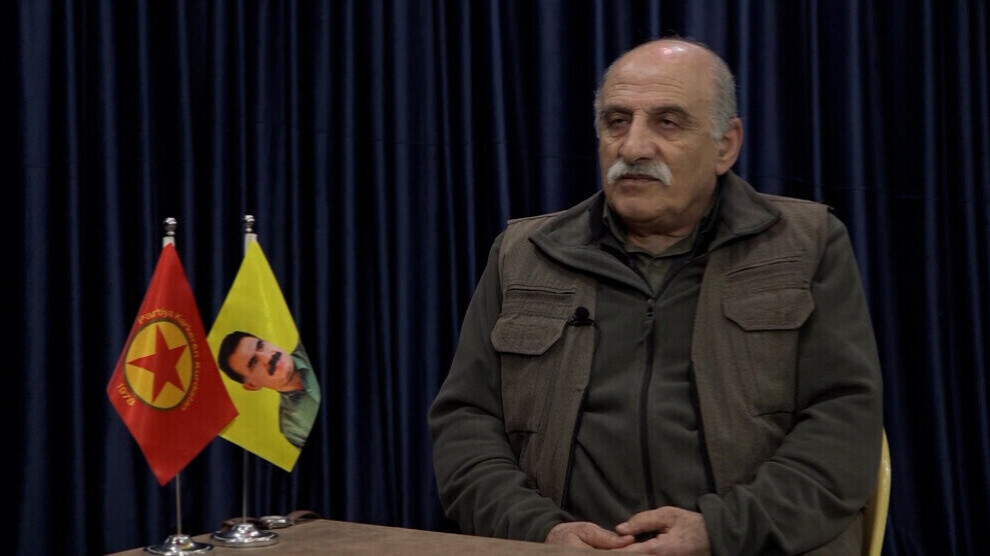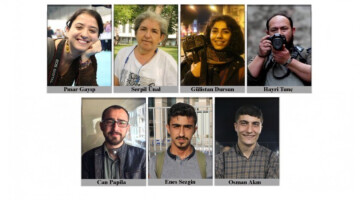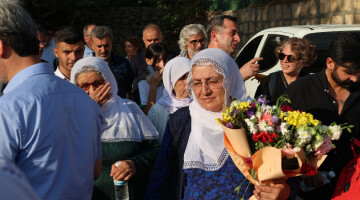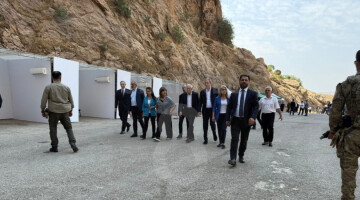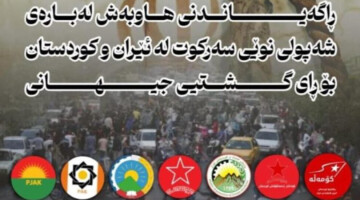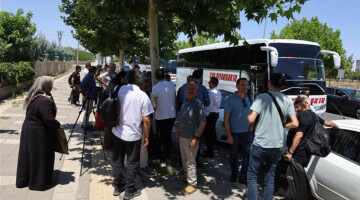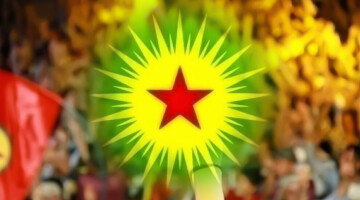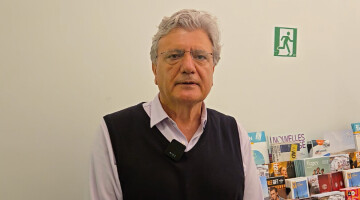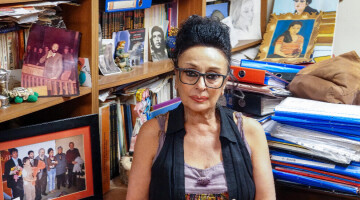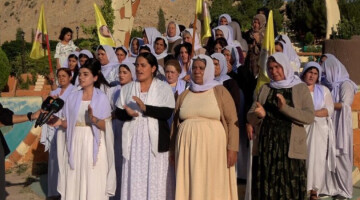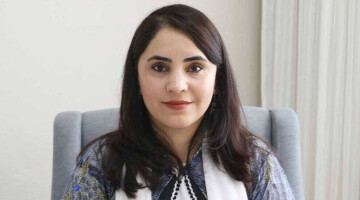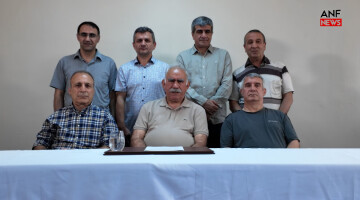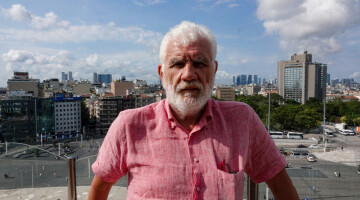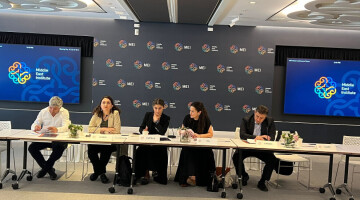PKK Executive Council member Durkan Kalkan spoke about the new geopolitical context, analyzing the role of China and the current Israeli war on Palestine.
The first part of this interview can be read here
During the Kobane process, a tactical alliance was made with the USA. In the first years, there were different explanations from the movement about why this alliance was made and what the issue of tactics and strategy was. Now it has been almost 10 years and it would be good to make a current assessment. What is the status of this alliance? Why is it still being maintained? How should the third way strategy be evaluated in this context? What are your strategies towards the USA and Russia for the solution to the Syrian problem and, at the same time, your anti-imperialist perspective? What is your understanding of anti-imperialism on this basis? How should the relevant anti-imperialist policies of the movement in the four parts of Kurdistan be understood?
As we have briefly stated above, we do not consider any state as a strategic ally. Our strategic allies and ideological friends are non-state and non-power forces. Therefore, all states are tactical relations and alliance forces for us. In a tactical relationship, there is no such thing as being on the side of one of the two states or power forces and being associated only with it. In other words, it is not possible to side with one of the anti-interest power and state blocs. Such situations occur between strategic allies. Since no state is our strategic ally, we do not stand for one and against the other. We are based on tactical relations with all of them. This means that we always exist as the third politics against the two power blocs. Therefore, there is no such thing as a third strategic line. This concept does not belong to us. We mainly call it the 'third political power'. Some people also refer to it as the 'third political line'. But all this does not mean a 'third strategic line'. Because if strategy is involved, then ideology also comes to the fore. As such, the concept of a 'third line' emerges. However, we, as a movement, have never defined such three lines or a third line and we do not do so now. As the human species, we define today's world life in terms of two opposing forces: 'capitalist modernity and democratic modernity'. We express history in the form of two historical lines: 'the history of democratic civilisation and the history of statist or centralised civilisation'. There is no such thing as a 'third force', 'third strategic line' or 'third line'. The theoretical definitions put forward by Leader Abdullah Öcalan in the Defence are very clear in this respect.
There is no other force that has defined and analysed the system of capitalist modernity as accurately and holistically as Leader Abdullah Öcalan and the PKK. Again, no one has defined the system of democratic modernity that can be realised as an alternative to the capitalist modernity system. The PKK is not only against capitalist exploitation, but also against industrialism and nation-statism, that is, against its modernity. Therefore, today there is no anti-capitalist force as holistic and consistent as Leader Apo and the PKK. As a movement, we are an anti-capitalist force and this determines our stance against imperialism in one aspect. On the other hand, we are an existence and freedom movement that has led the last fifty years of a people who have been fighting against colonialism and genocide for a hundred years. Therefore, since we have experienced imperialism and colonialism at the level of genocide, we think that we know and recognise them very well. Our anti-imperialist stance is also determined by this great struggle of fifty years beyond words. Therefore, it is not meaningful to question whether the PKK and the KCK have an anti-imperialist character.
At the end of 2014, the relationship and alliance that emerged in Kobani against the ISIS gangs was very important and fruitful. Therefore, it requires correct understanding and definition. If we refer to recent history, it can be likened to the alliance between the Soviet Union, the USA and Britain against Hitler's fascism. A similar broad alliance has emerged against the fascist-genocidal ISIS. Undoubtedly, the ideological dimension of this alliance is almost non-existent; it only expresses opposition to ISIS gangsterism and is based on mutual interests. In other words, it is a political relationship and an alliance. Conditions necessitated this, and a relationship of interest was formed against a greater danger. The relationship and alliance of the US and Coalition forces with the Rojava Freedom Forces is at this level. The factors that led to this have continued to exist and, for this reason, the relationship in question has been prolonged until today. Undoubtedly, there have been mistakes and deficiencies in practice while maintaining this relationship. Attitudes that could not understand this relationship adequately, and could not carry it out correctly in practice, have emerged. We are constantly evaluating and discussing this situation; we find the existing mistakes and deficiencies and criticise them in order to correct them.
We also seriously criticise and struggle against the current US and Russian policies towards Syria. This mainly manifests itself in the attitude towards the invasion attacks of the Turkish state against North-East Syria. It should be noted that the US and Russia have supported all the Turkish attacks so far to a great extent. So, who fought against these invasion attacks? It is very clear that all the peoples of North-East Syria, especially the Kurds, fought. They gave thousands of martyrs in this war. The battles of Afrin, Gire Spi and Serekaniye are remembered. All these resistances against the Turkish occupation were mainly a struggle against the policies of the USA and Russia. This needs to be understood very well by the socialist popular forces.
As for the improvement of the current Syrian situation and the overcoming of the fragmentation, we certainly want that too. But how will this happen? We must be able to give the right answers to this question. As a movement, we are in favour of Syria's internal forces solving Syria's problems and we are absolutely against foreign intervention. At the same time, we do not see bringing the governments east and west of the Euphrates side by side and uniting them as they are as a correct and realisable solution. We see the solution in the democratisation of Syria and the people's development of a democratic revolution. We believe that a democratic change in which all differences such as nationality, religion, sect, gender, class and similar differences organise themselves freely and govern themselves on the basis of democratic autonomy and unite within the system of democratic confederalism must develop and take place. North-East Syria is a beginning, a model and a spark for this. To paraphrase Mao Zedong's famous quote, a spark can lift up the whole society.
How do you position your struggle as the PKK within the global struggle for the construction of democratic socialism?
Since 1973, as a movement that was born and developed in Kurdistan, we first defined ourselves in two dimensions: one was to be a socialist movement, and the other was to be a national liberation movement. We wanted to lead the Kurdistan national liberation struggle under the leadership of socialist ideology and realise the solution of the Kurdish nation-state. On this basis, we tried to study and understand Marxism-Leninism in many ways. We studied the national liberation movements of the period from Vietnam to Cuba and Angola and took them as examples for ourselves. On this basis, we waged a very intense ideological, political and military struggle. After the assassination of Comrade Haki Karer on May 18th 1977, we started to use armed violence as a duty of revolutionary revenge while developing and becoming a party. After the September 12th atrocities in the Diyarbakir dungeon and the 1982 historical resistance, we retreated to the mountains and started the guerrilla war against the Turkish State on August 15th 1984. Until the February 15th 1999 international conspiracy, we waged an uninterrupted guerrilla war and national liberation war for 15 years under the leadership of Leader Apo. At the end of such a war, in order to develop a nation-state solution to the Kurdish problem, Leader Apo travelled to Europe and reached Rome. So what did the European Union and the global capitalist system led by the USA impose on this demand? Obviously, the Imrali system of isolation, torture and genocide! They showed the Leader Apo, who wanted to find a political solution to the Kurdish problem, the Imrali torture and genocide path. This result required us to evaluate the entire struggle we have been waging since 1973 in many ways. This is what Leader Apo did under the Imrali system of isolation, torture and genocide, and on this basis he realised a paradigm shift.
In early 1990, after the collapse of the Soviet Union, Leader Apo and our party, like everyone else, tried to analyse the multifaceted causes of this collapse and to draw conclusions. The theoretical analyses developed by Leader Apo on this basis throughout the 1990s were indeed pioneering and hopeful. It played a very important role in overcoming the pessimism that developed after the collapse of the Soviet Union and in improving the morale of the revolutionary front. But it was not only the state of the Soviet Union that collapsed. Gradually, the national liberation movements, which had developed on the basis of the existence of the Soviet Union, one by one, began to establish multifaceted relations with the capitalist system. Vietnam, which was a source of inspiration at the time of the birth of our movement, turned towards multifaceted relations with the USA, with which it was in the most conflict in this new process. In other words, the national liberation struggles and nation-state systems in question, even if victorious, were not solutions; they did not create an alternative exploitation-free order; on the contrary, they merged with the imperialist system that they opposed. Therefore, the lack of a solution was not only experienced in Kurdistan and in the practice of the PKK, all the examples of the world were ultimately left without a solution. In other words, the ideology of the nation-state did not produce a real solution. Leader Apo also evaluated all this and developed the ideology of the democratic nation by breaking away from the ideology of the nation-state that produced an insoluble solution. By making a paradigm shift foreseeing this, he tried to overcome the lack of a solution and reveal the power of a solution. He assessed that socialism could not be realised through state rule, but only through democratic rule. In this framework, it overcame the state and the instrument of power and developed the instrument of democratic society and democratic confederalism. It resolved the contradiction between the goal and the means in socialist revolution and construction and harmonised the means with the goal. On this basis, it defined our new ideology as democratic socialism based on ecology and women's freedom.
As a movement, we consider ourselves more socialist than anyone else, that is, libertarian, egalitarian and sharing-communal. We do not consider equality here as the adaptation of women to men, but as the free existence and organisation of women as women and their equality with men on this basis. We do not consider the socialist revolution and construction as an event that took place after the seizure of political power; on the contrary, we consider the socialist revolution as a change and development on the basis of the ideology of the free individual and the democratic commune, and we define it mainly as an ideological change. Again, we do not see socialism, that is, the life of the free individual and the democratic commune, as realised after political power and statehood; we see it as lived and realised within a struggle that is not based on political power, starting from an individual, within the party and gradually in society, and we have been living socialism on this basis within the PKK for decades. For example, PKK cadres have no private property, their lives are completely communal. Everyone participates in the ordinary work according to their ability and everyone uses what they need. So, state property is not social property. Social or communal property is property owned by communal communities. To summarise all this, we consider Apoist theory to be the highest synthesis of revolutionary-libertarian thought up to now, and PKK practice to be the most communal life of socialism. We consider this as a new level of development in socialist theory and practice, and we believe that with this, socialist construction at the global level will develop and realise on more correct foundations and successfully. In short, we are not one of those who preach communal living while keeping private property for ourselves, or one of those who preach socialism but act according to the basis of capitalist individualism. We are trying to say the right words as much as possible and to create and live the integrity of word-action, theory-practice. On this basis, we endeavour to develop friendship and alliance with all our strategic allies at the global level, especially with the peoples of Turkey and the revolutionary-socialist forces, and to make the world livable together.
As a movement, how do you assess China's role in the geopolitical context and its importance for anti-systemic movements?
President Mao Zedong said, "China will never be a superpower". We attach importance to this statement and we believe that Chinese society will take this as a basis. But we also see that China has become a great economic and military power. In this respect, we, of course, attach great importance to China politically and take it as data in our evaluations. However, we do not see a new US-China bloc like the pre-1990 US-Soviet bloc as beneficial both for themselves and for the peoples of the world and the forces outside the system. Such a bloc binds all contradictions to itself and almost freezes them. No ideological, political and military struggle can be waged without taking one of these two powers as a basis. A multi-headed statist system, not a bipolar one, offers more possibilities and opportunities for the oppressed and exploited to wage their struggle for freedom and democracy. Although it is said that the USA has established an empire in the world, we do not see it like this. In fact, there are many heads in the statist system. Besides the USA, there is the EU, the UK, Russia and China. Some powers such as India are also growing. There is also the transnational monopolisation of capital. Such multi-headedness offers more possibilities and opportunities for struggle than the pre-1990 bipolarity. Because one does not have to rely on one state and make a strategic alliance with it.
Making a strategic alliance with a state means considering everything according to the interests of that state, which creates the domination of politics over ideology and prevents intellectual independence and freedom. One is forced to do whatever the interests of the state dictate. In this respect, it is better for the statist system to be multipolar rather than bipolar. In this respect, it is necessary not to want a China-US polarisation and not to lead China towards it.
We have nothing against China's development and strengthening, it is becoming a great economic, political and military power in the face of the USA and other states. Of course, it has also recently played an important role in reining in the US and NATO. It has largely frustrated US provocations in the Pacific. It also plays an important role in many problems within the UN. We, too, carefully analyse this and consider it important. After all, we are also an Asian country and society. However, we should clearly state that we do not have a very significant relationship with China. Our efforts in this may also be small. But on the basis of the coup d'état of 12 September 1980, the Turkish state attached great importance to its relations with China and prevented China from participating in the Kurdish problem by marketing the Uyghur Turks problem there. In other words, in return for not supporting the Uighur Turks, the Turkish state wanted China not to support the Kurdish people. This situation also played an important role in China's lack of interest in the Kurdish issue. We are aware of these and we want to overcome them. But we cannot act quickly because of the intense struggle. We hope that all these will be overcome in the future.
Palestine is seen as a central reference on all continents. Even though left-wing movements on the ground have weakened, the issue is still a centrepiece of all international conferences. Hundreds of civilians have been killed in Palestine since the beginning of the year. What is your view of the situation in Palestine? Not only historically, but how do you see the prospects for a solution? How do you evaluate the struggle for the right to self-determination in Palestine?
As a people coming from the depths of history, living in the centre of the Middle East and under genocidal attack for a century, we believe that we have a more accurate and deeper understanding of both the Jewish tragedy from history and the struggle of the Palestinian people against imperialism, Zionism and reaction. We always keep in mind the revolutionary role of the Palestine Liberation Movement, which is a source of inspiration in our region. In our region, the Palestinian people have been the most important people who have been in brotherhood with the Kurdish people. All organisations within the Palestine Liberation Organisation provided the most important support to our party after the military-fascist coup of September 12th 1980. We always thank them for this. The Kurdish guerrilla resistance received its first basic training in Palestinian camps. I, too, received my first basic training in Palestine and I am also a Palestinian guerrilla. I have expressed many times that I am always proud of this.
Undoubtedly, the Palestinian people's struggle for freedom and democracy is sacred and their right to a free and democratic life can never be discussed or negotiated. Kurds know best what the psychological impact of such a situation is. We are always in favour of the Palestinian people's struggle on this basis. However, religious currents have recently developed there too, and in our opinion they have caused some damage to this just struggle. Again, as in all problems, we see the imposition of a statist solution here and the division of that tiny piece of land into two states, for example, to the detriment of those peoples at most. In our opinion, the non-state solution of democratic confederalism is most necessary there and would be the most important salvation for the Palestinian people. While resisting the oppression and exploitation of Israel, it is not a good thing to fall under the oppression and exploitation of the Arab rulers. The policy of divide-conflict-rule is a policy of imperialist exploitation. Undoubtedly, it is difficult and a historical enmity has been formed. Nevertheless, the best solution for all peoples and the oppressed is democratic confederalism on the basis of democratic autonomy. Palestinian-Israeli democratic confederalism can gradually give birth to the democratic confederal unity of the peoples of the Middle East, which is the best solution for us. As a movement, we take the Democratic Middle East Confederation as a basis and defend it.
Kurds and Arabs will undoubtedly play a very important role in such a regional development. We see Kurdish-Arab relations as very important and of strategic value in this respect. For this, we believe that the alliance and brotherhood between the Kurdish and Palestinian peoples, which was formed in the early 1980s, will play a core role. Of course, the Jewish community will also have a place in this democratic union. Jews are also a historical part of the social reality of the Middle East. They are creative and advanced in intellectual and economic production. They have also made a significant contribution to the development of socialist ideology. They also have a certain democratic experience. The most extensive and comprehensible analysis of the Jews was made by the Leader Abdullah Öcalan in his Defences. If Zionist influences are removed and democratic measures are taken as a basis, the Jewish community can also have an important place and contribution in the unity of the democratic Middle East. In our opinion, this is the correct and solution-producing approach. Otherwise, the narrow nation-state approach and monopolistic stance will only result in developing new conflict processes.
How do you assess Israel's role in the Kurdish question in general and the Israeli regime's relations with various Kurdish actors in the region?
The creation of the state of Israel should not be treated as a singular event. It is a project of the capitalist system and was put into practice throughout the twentieth century. Before the State of Israel, in 1923, the Republic of Turkey was set up by Britain as a proto-Israel. The alliance of Britain and France with the Kemalist Movement and the Treaty of Lausanne are based on this. Three years after the First World War, the Turkish Republic was established and, on this basis, the capitalist-imperialist system tried to dominate the Middle East. Three years after the Second World War, the establishment of the State of Israel, again under the leadership of Britain, was completed and Israel was included in the hegemony war being waged in the region by the Turkish Republic. The aim of these two powers is to bring the Middle East under global capitalist hegemony. Undoubtedly, this is intended to be done on the basis of a racist-chauvinist-genocidal understanding and policy. This is based on the Armenian, Assyrian-Syriac, Greek and Kurdish genocides. Therefore, one of the founding aims of the State of Israel is to prevent the Kurdish people from being independent and free. This was tried to be carried out on the basis of the Turkish-Israeli alliance. When the PKK developed and strengthened and imposed the freedom of the Kurds on world politics, the so-called Kurdish administration in Hewlêr emerged as a third force against this situation in early 1990. Although the war against our party was planned by NATO, in practice it was carried out by the Turkish Republic, Israel and the KDP. This reality is the basis of Israel-TR and Israel-KDP relations.
Launched on October 9th 1998, the international conspiracy attack aiming at the destruction of Leader Abdullah Öcalan was decided, planned and implemented together by the USA, the UK and Israel. When Leader Apo went to Russia, the Israeli state worked first and foremost to get him out of there. For 25 years, the State of Israel has been one of the main actors in the continuation of the İmralı system of torture, isolation and genocide and the imposition of extermination on Leader Apo on this basis. Today, Israel is working to buy the land of Kurdistan and is pouring a lot of money into it. The fact that it is sometimes shown as if there is a contradiction and conflict between the Israeli and Turkish states is a game played in order to mask reality and deceive the peoples.
As a result, the Jewish capital played one of the leading roles in the creation and continuation of the colonialist-genocidal attack called the Kurdish question. Today, they still play a role in blocking the solution. They give the most support to AKP-MHP fascism. They also have close relations with the KDP on this basis. There are already many allegations that the Barzanis are Freemasons. The State of Israel is opposed to the Kurdish freedom struggle on the one hand because of the opposition of global capital to Kurdish existence and freedom, and on the other hand, because Jewish nationalism considers Kurdistan as its own territory, and on this basis it conducts an active policy and plays an active role. However, despite all efforts, the success envisaged so far has not been achieved. What will happen from now on and whether there will be a change in this mentality and politics will be shown by the upcoming struggle. The Kurds do not have even the slightest trace of a racist approach and anti-Semitism. If the Jews also recognise the Kurdish reality and the right to a free life, then the situation so far may change.
For a democratic Middle East and a democratic world where peoples live together in fraternity! For World Democratic Confederalism!

